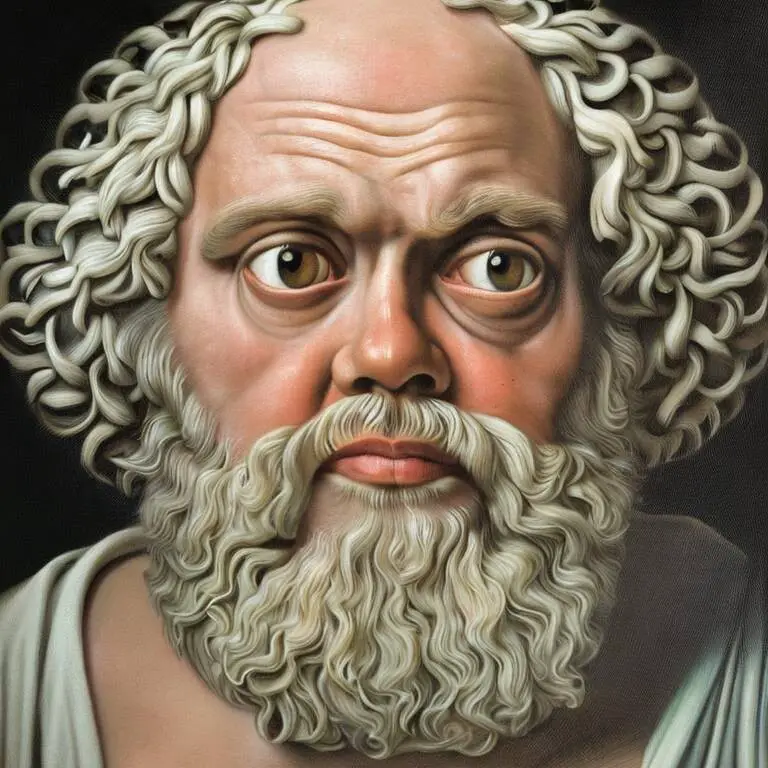|
Getting your Trinity Audio player ready...
|
Socrates is best known for his views of knowledge and wisdom, morality and virtues, and self-awareness improvement. The great philosopher never wrote anything down, and so famous quotes by Socrates have been shared with us through others.
The most important and revealing of the famous Quotes by Socrates offer an insight into the great philosopher’s work and they still resonate with people today. Join me as we explore Socrates’ central ideas on knowledge, wisdom, morality and virtue, through his words.
Behind Famous Quotes by Socrates

You may be familiar with some of the famous quotes by Socrates you see in this article. But what lies behind them?
Socrates had a personal, dialogue-based approach to philosophy, and he focused on the inner self and living a good life. These two factors make his quotes and teachings a perfect combination of approachable and applicable. His insights span across time and location, so they can be inspirational to just about anyone.
Because he never documented his work, everything we know about his philosophy, and his quotes, has been provided mainly by his students. We will never know what has been paraphrased or summarized, so It makes you wonder what is verbatim.
The lack of documentation raises another issue. When searching through Socrates quotes, many are misattributed to Socrates. Even some allegedly famous quotes by Socrates are not his. And his quotes translated into English further alters them, so the meaning may be distorted. Plus, there are multiple translations for each quote, making their purity even more unreliable.
Despite these challenges, many of Socrates quotes specified in Quotationize, provide a trustworthy list of his quotes. They include those found in the works of Plato, Diogenes, Xenophon, and Plutarch.
Get behind Socrates and into his mind by studying The Apology. Plato’s brilliant summary of Socrates’ defense speech to the Athens court during the trial that saw him receive the death penalty,is further summarised by SparkNotes.
Socrates’ Views on Knowledge and Wisdom
There are several Socrates quotes that highlight his views of wisdom and knowledge. Socrates believed that true wisdom comes from acknowledging one’s own ignorance and a desire to constantly learn and improve. This is one of his most prevalent beliefs, and it is no surprise that many of his most famous quotes relate to this idea.
Socrates on Ignorance
Socrates believed we are ignorant, and to add insult to injury, usually unaware of our own ignorance. For him, the only route to wisdom is through acknowledging our ignorance. This is best illustrated through the following quote:
“I know that I know nothing”.
From here, Socrates felt it safe to postulate:
“…I am better off than he is for he knows nothing and thinks that he knows. I neither know nor think that I know. In this latter particular then I seem to have slightly the advantage of him.”
Socrates believed that ignorance was the root of all evil:
“there is only one good, knowledge, and one evil, ignorance.”
We discuss this view further in our section on morality.
Socrates on Teaching and Learning
Socrates was a teacher as much as he was a philosopher. Wandering Athens and sharing his teachings was what philosophy was all about as far as he was concerned. He taught using a method of questioning that helped lead his students to conclusions.
This is referred to as the Socratic Method. And, Socrates’ approach to teaching stems directly from his views on ignorance. For example:
“I cannot teach anybody anything. I can only make them think,” and
“Education is the kindling of a flame, not the filling of a vessel.”
Reading these quotes, it is easy to see how seamlessly Socrates translated his teaching philosophy into his real-world teaching approach.
Socrates’ on Morality and Virtues
His views on morality and virtues are heavily intertwined with his views on knowledge and the inner self.
On Virtue
Socrates believed that virtue is more important than wealth and other material possessions, when he said:
“Virtue does not come from wealth, but wealth, and every other good thing which men have, comes from virtue.”
And he then stated:
“Virtue is knowledge.”
On Morality
He believed ignorance was the root of all evil:
“There is only one good, knowledge, and one evil, ignorance.”
He also spoke often of death, and how it should not be viewed as evil:
“…no one knows whether death, which men in their fear apprehend to be the greatest evil, may not be the greatest good. Is not this ignorance of a disgraceful sort, the ignorance which is the conceit that a man knows what he does not know?”
The great philosopher believed that a good person is not concerned with worldly possessions, but –
“Bad men live that they may eat and drink, whereas good men eat and drink that they may live.”
In this quote, Socrates emphasises that a moral person indulges their natural needs as a means to an end. That is, rather than indulging in food and drink as something good, we satiate our needs so that we can move on to more important things, such as self-reflection.
Socrates’ Views on Self-Awareness, Self-Improvement, and Happiness.
One topic where Socrates’ quotes resonate most is that of awareness and improvement. He believed that self-awareness and self-improvement are essential to living a meaningful life. This can be summed up through one of the most famous quotes by Socrates:
“Know thyself.”
And perhaps his most famous quote of all is:
“The unexamined life is not worth living.”
The Inner Self
Socrates claimed that understanding the inner self is fundamental to living a good life.
“For my aim is to persuade you all, young and old alike, not to think about your lives or your properties, but first and foremost to care about your inner self.”
Self-Improvement
He also believed we should strive to be the best version of ourselves. These are two of his quotes that stand out:
“The greatest way to live with honour in this world is to be what we pretend to be,” and
“Knowledge which is acquired under compulsion obtains no hold on the mind.”
His belief that self-improvement can only be achieved after attaining self-awareness is emphasised in this quote:
“…the man who knows himself knows what is advantageous to himself.”
Happiness
Happiness stems from within yourself, and can be achieved when we acknowledge our ignorance and work to understand our inner selves. It cannot be achieved through things in the outside world. This is what Soctares believed fervently:
“Happiness does not consist in luxury and magnificence; on the contrary, he who stands in need of the fewest things comes nearest to the divine nature.”
Finally
The most important and revealing of the famous quotes by Socrates offer a glimpse into the history of philosophy and they still resonate with people today. They highlight his beliefs on knowledge, morality, virtue, self-awareness, and self-improvement. His philosophy continues to be as relevant and important in contemporary society as it was when he spoke it.
We are fortunate the impact Socrates had on his students compelled them to commit so much of his work to writing. Thanks to them, we too can learn from him in our personal lives, in teaching settings, and in other disciplines.
FAQs
Q. What is Socrates famous for?
A. Socrates is famous for his contributions to philosophy and his method of questioning known as the Socratic method. He is considered one of the founders of Western philosophy and is known for his emphasis on self-awareness and self-improvement.
Q. What is the main message of Socrates’ quotes?
A. The main message of Socrates’ quotes is that true wisdom comes from acknowledging one’s own ignorance and a desire to constantly learn and improve. He also believed that virtue is more important than wealth and other material possessions, and that self-awareness and self-improvement are essential to living a meaningful life.
Q. What is the Socratic method?
A. The Socratic method is a method of questioning used by Socrates to stimulate critical thinking and to expose the contradictions in people’s beliefs. It is a dialogue between individuals, in which one person questions another person to encourage them to examine their own beliefs and understand their own knowledge.
Q. What is Socrates’ belief on knowledge?
A. Socrates believed that true wisdom comes from acknowledging one’s own ignorance and a desire to constantly learn and improve. He famously said, “the only true wisdom is in knowing you know nothing.” and “I know that I am intelligent, because I know that I know nothing.”
Q. What is Socrates’ view on living a meaningful life?
A. Socrates believed that self-awareness and self-improvement are essential to living a meaningful life. He said, “The unexamined life is not worth living.” He also believed that we should strive to be the best version of ourselves. He said “The greatest way to live with honour in this world is to be what we pretend to be.”

